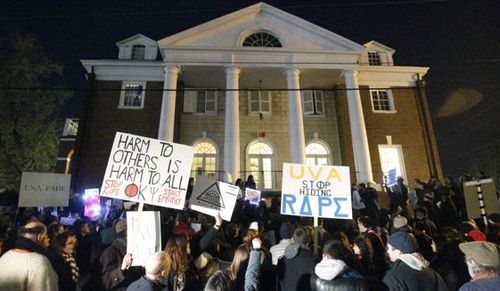


12/23/2014
In Sabrina Rubin Erdely’s telling in Rolling Stone, with its four instances of glass shattering, every night on fraternity row at the University of Virginia is a cross between Kristallnacht in Nazi Germany and the Cossack pogrom that provides Fiddler on the Roof with its punchy last scene before intermission. Not surprisingly, her cliched hate fantasies about the “overwhelmingly blond” students were quickly turned into reality by some of her readers on this supposedly deeply conservative campus. From the Washington Times:
Unpunished vandalism rampage inspired by Rolling Stone’s U.Va. rape story Student activist who led vandalism attack on Phi Kappa Psi fraternity house says he has no regrets By Jeffrey Scott Shapiro — The Washington Times — Sunday, December 21, 2014 In the wee morning hours after Rolling Stone’s now-retracted gang rape story roiled the University of Virginia campus, a masked group of five women and three men unleashed their fury on the Phi Kappa Psi fraternity house at the center of the controversy. Bottles and bricks were tossed through nearly every first-floor window, sending shards of glass and crashing sounds into the house around 2:30 a.m. on Nov. 20. Profane, hate messages such as “F — k Boys” were spray-painted on the walls of the colonial facade, along with anti-sexual assault epithets such as “suspend us,” and “UVA Center for Rape Studies.” The Charlottesville, Virginia, police blotter unmistakably describes the attack as a crime. “Vandalism and destruction of property,” it reads. Felony charges also could be attached because the crime involved throwing dangerous objects into a private dwelling and because the damage may total over $1,000. It’s unclear how many fraternity brothers were in the house at the time. Yet more than a month after the attack, no arrests have been made and no charges have been filed. The fraternity house, its shattered windows now boarded with plywood, remains vacant. Like the Ferguson riots, there has been little accountability for those who perpetrated violence in the name of protest. Police and prosecutors declined to say whether or when they might make arrests in the attack on the fraternity house. Yet finding a student willing to admit his or her role as well as eyewitnesses who saw the group conduct the attack was relatively easy for a Washington Times reporter who spent two days on campus. After all, a witness who found a cellphone at the scene he believed belonged to a perpetrator gave the device to police. The witness, who spoke to The Times only on the condition of anonymity because of fears of retaliation, said the cellphone had a text message from a second person he believed also participated in the attack. “That was exhilarating,” the message said. After finding witnesses, cellphone information and social media postings bragging about the attack, The Times tracked down a male student identified by witnesses as a possible leader of the attack. The student agreed to talk to The Times only on the condition that his name wasn’t published, saying he didn’t want police to find him. The young man, the progeny of a privileged family, readily and unrepentantly admitted his role and described the attack his friends carried out in details that match police and eyewitness reports. He also said he knew his actions would be considered illegal. “I texted one of my friends and I was like, ‘Let’s throw bottles at the Phi Psi house tonight,’ and she said, ‘Yes!’ I think that the article made it clear that victims at the university have no legitimate channels to take action, and I think vandalism is a completely legitimate form of action when like, legitimate authority is corrupt. I think it was justified,” he said in an interview with The Times. … “I’ve done some thinking about that, but the answer is no. Everyone knows this is a house that does not respect women. They are part of the problem, and I do not feel bad. We have an objective set of laws that empowers the police to kill black men with impunity and protects white rapists at U.Va. from prosecution. The laws are only legitimate when they work. This is not a particularly radical campus, but we’re mad. … Those views, he said were supported by the textbooks issued at U.Va., which he described as “tools for understanding” oppression.This was an obvious hate crime on campus, not the usual hoax. There’s a widespread pattern in modern America where the culturally dominant project their worst characteristics onto their victims. Once you start looking for it, it pops up all over the place.